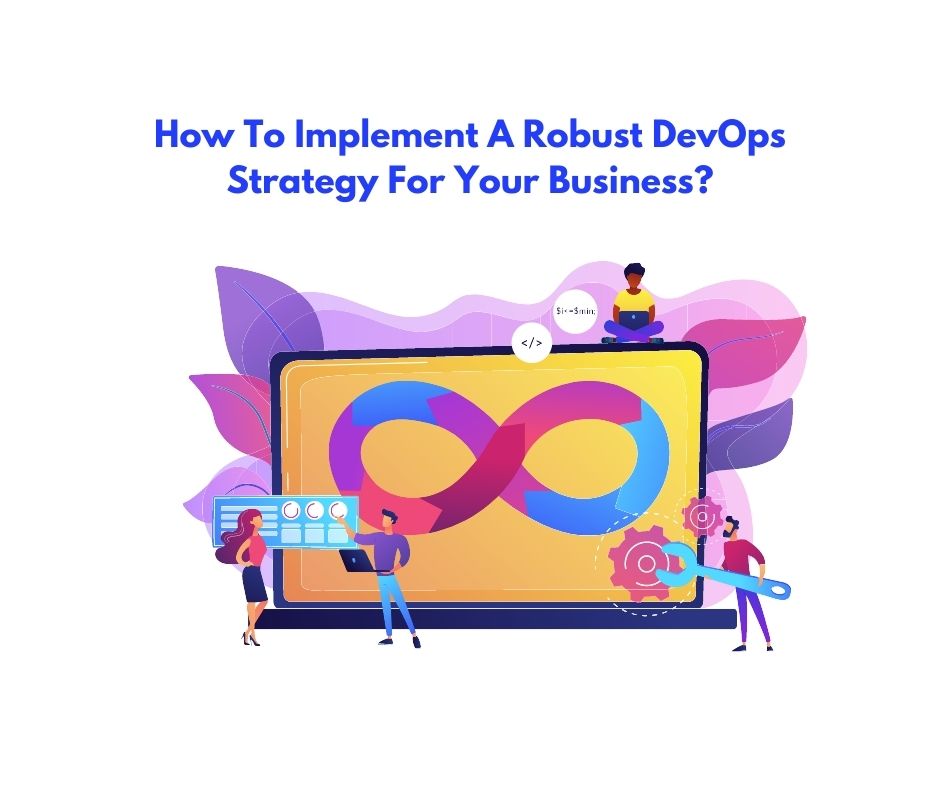How To Implement A Robust DevOps Strategy For Your Business?

DevOps is the practice of integrating development and operations within an organization to create a more agile and responsive system. By automating critical processes, DevOps allows your business to move faster and deliver higher quality products. DevOps can be implemented in a variety of ways, depending on your company’s needs. However, there are six key principles that should always be included in any DevOps strategy.
Below, we will outline these principles and how you can implement them in your business.
1) Leverage automation for faster delivery: By automating common tasks, you can speed up delivery times by 50%. This will allow you to release products more frequently and improve quality while also reducing costs.
2) Streamline processes: By eliminating unnecessary steps and creating standardized processes, you can reduce cycle times by 50%. This will help to improve communication between teams and foster collaboration across departments.
3) Improve Software Quality: By implementing automated testing and quality assurance procedures, you can ensure that your software is of the highest quality. Additionally, automated monitoring will help you to detect problems early and fix them before they cause serious issues.
4) Create a More Agile and Responsive System:by adopting an agile development methodology, you can create systems that are more responsive and able to adapt quickly to changes in the environment. In addition, data-driven culture allows for constant feedback loop between teams which leads to better decision making.
5) Build a Data driven Culture:By collecting data from all aspects of the business, you can build a comprehensive understanding of how customers behave (and don’t behave). This data-driven culture helps make better decisions about product design or marketing campaigns. Finally, by using predictive analytics technologies such as machine learning or artificial intelligence (AI), your company can make even more informed decisions about how best to serve its customers.
Maximizing Efficiency With DevOps Automation
Do you find yourself struggling to keep up with the ever-increasing demands of your software delivery? Are you tired of trying to remember all the different steps that need to be taken in order to deploy a new update or update a running application? Do you feel like you’re constantly fighting fires, instead of focusing on your goals? The DevOps Training in Hyderabad program by Kelly Technologies can help to develop the skills needed to handle the tools and techniques associated with DevOps.
If you answered yes to any of these questions, then it’s time for you to learn about DevOps automation. DevOps automation is a process that helps IT teams automate their workflow in order to improve team efficiency and speed up the delivery process. By using workflow automation tools, IT teams can move faster and more efficiently through their software development lifecycle. In addition, this process can help to improve collaboration between different departments within an organization.
One of the most important aspects of DevOps automation is machine learning. With machine learning, IT teams can use predictive analytics to make better decisions and predictions about future outcomes. This helps reduce the amount of time needed to execute tasks, as well as reduces potential risks associated with potential failures or incorrect predictions.
Another important aspect of DevOps automation is containerization. Containerization enables IT teams to create isolated environments that are both secure and scalable. This allows them to deploy applications quickly and easily without having concerns about data loss or performance issues. In addition, containerization can also help organizations comply with security and compliance regulations by isolating sensitive data within its own containers.
Last but not least, tracking performance metrics is essential for any organization looking into implementing DevOps automation into their workflow. By tracking key performance indicators (KPIs), IT teams can identify areas where they need improvements or optimizations before proceeding with other steps in their automated deployment process. This information will allow them not only measure success but also identify areas where additional work needs be done in order for the deployment process to run more smoothly overall..
Common Challenges Of Adopting DevOps In Your Business
DevOps is a popular way of working that has seen rapid adoption in recent years. DevOps is short for development, operations, and security. It’s a way of integrating development and deployment processes so that they are coordinated and automated. This helps to reduce downtime and improve availability while also improving collaboration between development and operations teams.
There are several challenges that businesses face when adopting DevOps, but we will focus on four specific challenges here. First, increased deployment frequency can lead to increased complexity and confusion. Second, reduced downtime and improved availability can be difficult to achieve without investing in automation. Third, scalability can be an issue if you don’t take measures to ensure it’s available when needed. Fourth, DevOps requires a strong understanding of security and governance concepts to be successful. By addressing these Challenges head-on, you can improve your business’ overall efficiency and scalability.
How To Overcome Obstacles When Implementing DevOps
DevOps is a powerful software development and delivery platform that has been gaining in popularity in recent years. DevOps is a collaboration between developers, system administrators, and other IT professionals to improve the speed, quality, and efficiency of software development. By adopting DevOps practices into your business, you can achieve improved business performance. However, there are many challenges that organizations face when implementing DevOps. In this section, we will outline some of the current challenges and strategies for overcoming them.
When adopting DevOps for your business, you will face several challenges related to technology infrastructure and process layout. For example, your current development environment may not be suitable for high-volume web applications or microservice architectures. It’s important to analyze your current infrastructure and layout before making any changes so that you can make the most informed decisions about which DevOps practices to adopt.
Another challenge that organizations face is managing change effectively. When introducing new software development practices into an organization (such as DevOps), there is often a lot of resistance from stakeholders who are not used to change. It’s important to create a collaborative relationship between all stakeholders so that everyone understands and supports the goals of DevOps. Additionally, it’s essential to invest in the right tools and resources so that you can quickly implement changes without complications.
Last but not least, one of the main benefits of adopting a DevOPS culture is improved time-to-market for new products or services. By automating common processes across multiple environments (development, QA testing, production), you can reduce the time it takes to launch new products or services into production. In addition, using modern monitoring tools allows you to detect errors early on in the product lifecycle so that they can be fixed quickly without impacting users or customer serviceability. This article in the digitalcertainly must have given you a clear idea about DevOps industry.





